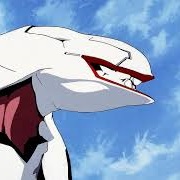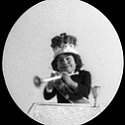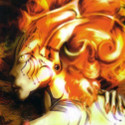|
SHISHKABOB posted:I'm not so sure about pride being the thing that Tolkien is making out to be the "bad thing". I say this because I seem to remember a lot of situations where characters or groups of people are described to be "proud", but I never felt like it was necessarily in a bad way. Like I'm pretty sure that the Men of Gondor are in general described to be a proud people, and maybe also the Rohirrim. You can be proud of something without being prideful. Aule was proud of the Dwarves he made, but as an expression of his wish to emulate Iluvatar, and not his own pride. Feanor, on the other hand, was prideful in the work he made and not humble about the ultimate origins of his work (he did not make the light of the Trees which gave them their ultimate beauty). I hate to go all wikipedia, but it makes the different most clear "With a negative connotation, pride refers to an inflated sense of one's personal status or accomplishments, often used synonymously with hubris. With a positive connotation, pride refers to a satisfied sense of attachment toward one's own or another's choices and actions, or toward a whole group of people, and is a product of praise, independent self-reflection, or a fulfilled feeling of belonging. " In Tolkien, the latter pride is fine.
|
|
|
|

|
| # ? Apr 18, 2024 23:53 |
|
rypakal posted:You can be proud of something without being prideful. Aule was proud of the Dwarves he made, but as an expression of his wish to emulate Iluvatar, and not his own pride. Feanor, on the other hand, was prideful in the work he made and not humble about the ultimate origins of his work (he did not make the light of the Trees which gave them their ultimate beauty). Okay, I think I get it.
|
|
|
|
Melkor's evil is probably best interpreted as being driven by pride. He coveted the Flame Imperishable, which was Iluvatar's alone and embodied the power of true creation, and he sought to dominate Arda utterly as its supreme god. The distinction between Melkor and Aule is very instructive when talking about pride in Tolkien - both imitated Iluvatar, but while Aule did so to glorify Him, Melkor only wanted to glorify himself.
|
|
|
|
SHISHKABOB posted:I'm not so sure about pride being the thing that Tolkien is making out to be the "bad thing". I say this because I seem to remember a lot of situations where characters or groups of people are described to be "proud", but I never felt like it was necessarily in a bad way. Like I'm pretty sure that the Men of Gondor are in general described to be a proud people, and maybe also the Rohirrim. The word "proud" on the other hand is used to describe both good and evil things. When it's used to describe animals or objects it's always positive. It's more interesting to check who aren't ever described as proud. Gandalf is accused of being proud by Saruman and Denethor, but he isn't ever described as being proud or looking proud. Frodo is only once described as sounding proud when he tells to Faramir about his mission. And humble Sam isn't ever proud. Neither is Gollum. These people are the ones who defeat Sauron. And in contrast the rest of the hobbits are quite a smug bunch. There are of course the Bongo Bill posted:Melkor's evil is probably best interpreted as being driven by pride. He coveted the Flame Imperishable, which was Iluvatar's alone and embodied the power of true creation, and he sought to dominate Arda utterly as its supreme god. The distinction between Melkor and Aule is very instructive when talking about pride in Tolkien - both imitated Iluvatar, but while Aule did so to glorify Him, Melkor only wanted to glorify himself. That's a good example about Tolkien's view of pride. Another one is the Fall of Numenor. Tolkien has said that the most important thing in his stories is death and the how to face it. The Men of Numenor grew too proud and tried to rise against Valar to gain immortality and the Valar punished them for it. Men should have been happy with what they were given and they should have surrendered to the will of Valar. Hogge Wild fucked around with this message at 02:50 on Feb 23, 2013 |
|
|
|
Bongo Bill posted:Melkor's evil is probably best interpreted as being driven by pride. He coveted the Flame Imperishable, which was Iluvatar's alone and embodied the power of true creation, and he sought to dominate Arda utterly as its supreme god. The distinction between Melkor and Aule is very instructive when talking about pride in Tolkien - both imitated Iluvatar, but while Aule did so to glorify Him, Melkor only wanted to glorify himself. One of the things I particularly enjoyed on Morgoth's Ring was the Myths Tranformed chapter, which has an interesting section called "Notes on motives in the Silmarillion". Tolkien essentially argues that Morgoth is an extreme nihilist (as he puts it), unable to tolerate the existence of anything that was not of his own devising.
|
|
|
SHISHKABOB posted:I'm not so sure about pride being the thing that Tolkien is making out to be the "bad thing". I say this because I seem to remember a lot of situations where characters or groups of people are described to be "proud", but I never felt like it was necessarily in a bad way. Like I'm pretty sure that the Men of Gondor are in general described to be a proud people, and maybe also the Rohirrim.  As for my memory, I use it for many things, only some of them hobbit-related. For a bit more content, I read in the reviews of that fellow who did the 'Tolkien was the greatest author of the 20th century' book that said he said, essentially, that Middle-Earth is a bit less monotheistic and catholic than JRRT may have wanted to think. Can anyone say what his argument's thrust is? I intend to order the book with my next paycheck, but that's a while away. Nessus fucked around with this message at 09:02 on Feb 23, 2013 |
|
|
|
|
A while back someone asked about Tom Shippey's books; I wholeheartedly recommend them, though I'd say The Road to Middle Earth is better than Author of the Century. It depends on what exactly you're looking for, really; while both of them cover some of the same ground, Road is primarily about Tolkien's philological background and very thoroughly covers the Ancient and Medieval literature that influenced the Lord of the Rings and how Tolkien tried to preserve or revive a literary tradition that was all but forgotten. Whereas Author approaches Tolkien as [an] author of the [20th] century and how he compares to other writers of his time who dealt with the same issues of the World Wars, industrialization and evil in the modern world, such as Orwell, Golding, Vonnegut, etc. Both are very readable, but I found Author to be a bit of a retread; I would say if you really want to understand Tolkien, The Road to Middle-Earth is probably the single best book for that.
|
|
|
|
Well folks, it's time for my biennial attempt to read these loving books, so here goes! I've made it through The Hobbit, which I love, but now I'm about to start LOTR so wish me luck. Once I even made it to The Two Towers! On the subject of Tom Bombadil, I love that guy. His chapters are kind of dumb but I love the idea of a character so mysterious and powerful that even Gandalf and Elrond don't know what the gently caress. On the other hand I kind of hate all the rabid speculation about him. Tolkien himself went on record saying that he just shoved Bombadil in there because he liked him and the stories he'd written about him before. He's not supposed to be God or whatever, he's just some magical dude in the woods.
|
|
|
|
paint dry posted:Well folks, it's time for my biennial attempt to read these loving books, so here goes! I've made it through The Hobbit, which I love, but now I'm about to start LOTR so wish me luck. Once I even made it to The Two Towers! Have you considered the audiobooks, available from Audible.com or your local library? What you're describing is the different between in-world analysis and external analysis. They're both valid. It's quite simple to understand that Tom Bombadil is an external creation dropped into the story who doesn't really fit. But once he's in there and you're doing in-world analysis, you have to find a place for him and justify his existence. However "it's an unsolvable mystery based on available data" is a perfectly valid point of view, even if I don't agree with it personally.
|
|
|
|
The in-world explanation is: he is a Maia. (as is Goldberry.) They both came to middle earth very early.
|
|
|
|
Or some kind of spirit of nature that is imbued within the planet.
|
|
|
|
concerned mom posted:Or some kind of spirit of nature that is imbued within the planet. Exactly. Which are called Maiar (or the Valar).
|
|
|
|
I think the one bit of info that kind of disputes that he is a Maiar is I believe he claims to have been the first being on Middle-Earth, before even Melkor, and in the Silmarillion it is claimed that Melkor is the first being from outside of the earth to enter it once it was created. It's been a bit since I read those parts though so maybe I'm missremembering it. Even so, it really just throws a wrinkle into the idea instead of doing away with it altogether because you could always rationalize it away as someone is mistaken in one of the accounts e: I'm reading the biography of Tolkien by Humphrey Carpenter and it's interesting to see how he developed his mythology and how he viewed it. Taking pieces of other ancient myths and legends and combining it with his imagination and treating it as if he were uncovering a history of sorts rather than making up a fantasy world. Levitate fucked around with this message at 19:21 on Mar 14, 2013 |
|
|
|
Here is the section from the Silmarillionquote:Thus it came to pass that of the Ainur some abode still with Il ̇vatar It does not say Melkor was exclusively first. Also from FotR quote:'Eh, what?' said Tom sitting up, and his eyes glinting in the gloom. 'Don't you know my name euphronius fucked around with this message at 19:26 on Mar 14, 2013 |
|
|
|
Levitate posted:I think the one bit of info that kind of disputes that he is a Maiar is I believe he claims to have been the first being on Middle-Earth, before even Melkor, and in the Silmarillion it is claimed that Melkor is the first being from outside of the earth to enter it once it was created. But yeah I do find it annoying that he isnt explained. Well what we gonna do, tolkien is very very dead!
|
|
|
|
rypakal posted:Have you considered the audiobooks, available from Audible.com or your local library? Eh, maybe. I've literally never listened to an audiobook so it'd be a first for me.
|
|
|
|
euphronius posted:Exactly. Which are called Maiar (or the Valar). No this isn't true. The Maiar were created outside of the earth and descended down unto it. Bombadil mentions that he is oldest so that gives a hint that he was there before even the Maiar. Plus Tolkein mentions that all the Fairies and like creatures descended down unto earth as well, so that sets a precedent for creatures and beings other than Maiar being supernatural. As he never specified what Bombadil is we'll never get an answer, but I like to think he is the spirit of the earth himself, not a Maiar.
|
|
|
|
paint dry posted:Eh, maybe. I've literally never listened to an audiobook so it'd be a first for me. Audiobooks are seriously critical to my sanity for any car ride over 30 minutes or any bike ride over an hour. Do it!
|
|
|
|
euphronius posted:Here is the section from the Silmarillion Ahh, got it. I didn't remember that it was said that "he too" was there from the first. I think realistically he doesn't have an exact fit into Middle-Earth and its mythology, but it's vague enough that there's certainly a strong argument for him being a Maiar.
|
|
|
|
Seaside Loafer posted:I always think of him as a Maiar. In Sil the main gods come to earth first and build it, the Maiar (lesser spirits) come after. So its not unreasonable for him to say he is the first if he just went to straight to proper middle earth as opposed to valinor like everyone else. Valinor and Middle-earth actually didn't exist when Arda (the world) was first created. They all lived on this big island thing in the middle of a big ocean at first, and then lots of poo poo happened. VVV also what that guy said VVV SHISHKABOB fucked around with this message at 00:17 on Mar 15, 2013 |
|
|
|
quote:But when the Valar entered into E‰ they were at first astounded So the Valar enter into Ea nothing is there, even though they thought of Arda in the Ainulindale. Bombadillo has to enter Ea and Arda at this point. He may have been the first Vala to be in Arda or whatever. This is the in-universe explanation at least. I think the out of universe explanation that JRRT just plopped one of his poetic creations in to be persuasive too.
|
|
|
|
Groke posted:For me it was the maps and appendices in The Lord of the Rings that first got me on the hook. I randomly stumbled upon the drat thing in my grandma's bookshelf when I was 10 or 11 and had no idea that such an apparently deep constructed world might exist. (Of course I was already the kind of kid who could spend all afternoon reading an encyclopedia.) You'd love the Atlas of Middle Earth by Karen Wynn Fonstad. I applaud the thread, OP. Perfidia posted:Because someone had borrowed the first book from the library and I was persuaded to just take the second right there ("it makes no difference, dear"). But I'm very serious -- it's an entirely different experience that way; too bad you can only do it once. I can really relate to the "can only do it once" sentiment. In fact I too started with book 2 about 30 years ago. My big sister had a box with books she'd read and I had no clue at the time that it was the second in a series. (In hindsight, I don't think at the time I even had a concept of a story that was broken up into separate books) I read about half way through it before another family member noticed what I was doing and got me reorganized with the Hobbit. I have probably gone through the series well over a dozen readings by now. I cannot watch the movies, as I simply don't want what the professor put into my mind's eye to be disturbed. Really wish I could read them all again for the first time. I kind of envy those who have no knowledge of the movies and are cracking them open for the first time. Fog Tripper fucked around with this message at 00:25 on Mar 15, 2013 |
|
|
|
Fog Tripper posted:I cannot watch the movies, as I simply don't want what the professor put into my mind's eye to be disturbed. Really wish I could read them all again for the first time. I kind of envy those who have no knowledge of the movies and are cracking them open for the first time. Eh, I kind of saw the movies as a new way to see the story again. A little like reading the books again for the first time, etc. I also found a lot of the imagery to be close to my own mental images (probably because I'd seen some stuff artists had done and they drew off a lot of those images for the movies). Reading the books is still a much different experience and I think I still kind of imagine it differently when I read them
|
|
|
|
The movies captured pretty accurately what I had imagined Middle Earth and its characters to be when I first read the LoTR 16 years ago, except for Aragorn, Boromir, Legolas and Frodo. In my imagination, Frodo was thin, ugly and gaunt; Strider was ugly as well, and not unlike a scarecrow. Boromir was basically a blonde Conan, and Legolas was dark-haired. It may be that the books never truly described the characters to be as I pictured, and the movies were indeed more faithful, but these images stuck with me as I read through the pages nonetheless.
|
|
|
|
Nycticeius posted:The movies captured pretty accurately what I had imagined Middle Earth and its characters to be when I first read the LoTR 16 years ago, except for Aragorn, Boromir, Legolas and Frodo. In my imagination, Frodo was thin, ugly and gaunt; Strider was ugly as well, and not unlike a scarecrow. Boromir was basically a blonde Conan, and Legolas was dark-haired. I'm pretty sure wood-elves are usually light-haired, so that wasn't a mistake. Frodo should definitely not have been played by a 19-year-old, though.
|
|
|
|
It's almost like trying to match physical descriptions is the absolute last thing casting directors should worry about when trying to find the right person for the role, because the only people who really care are spergs on the internet. This is no less than people complaining that the Stark kids are getting too old on Game of Thrones. Who cares are as long as they good at the role?
|
|
|
|
Silent Linguist posted:I'm pretty sure wood-elves are usually light-haired, so that wasn't a mistake. Frodo should definitely not have been played by a 19-year-old, though. I kind of liked the younger Frodo (and Sam), but yeah maybe they could have gone a little older looking... I have more issues with Aragorn's character in how he acts rather than how he looks. Seems too uncertain of himself and things compared to the books, but overall I think they did pretty good. It's never going to be perfect but they obviously put a ton of work into making it feel like Middle Earth Better than the casting for the Hobbit, cuz I certainly never though young dwarves would look like that 
|
|
|
|
Silent Linguist posted:I'm pretty sure wood-elves are usually light-haired, so that wasn't a mistake. Frodo should definitely not have been played by a 19-year-old, though. It was the Vanyar who were fair haired; the Teleri (of whom the Sindar were a part) would have been darker, some with grey-silver hair.
|
|
|
|
I needed a break from space opera's so I bought these 6 books: The Hobbit The Silmarillion The Children of Hurin The Fellowship of the Ring The Two Towers The Return of the King Is there any specific order I should read these in? I assume Hobbit -> Fellow -> Two Towers -> Return of the King, wherein would be the best place to read The Silmarillion and The Children of Hurin? e: quote:1. The Hobbit ^ That was on the first page, but saw no discussion about it. Is that a good reading order? Iseeyouseemeseeyou fucked around with this message at 06:30 on Mar 17, 2013 |
|
|
|
Iseeyouseemeseeyou posted:I needed a break from space opera's so I bought these 6 books: Your best bet would either be publication order or to save The Silmarillion for last. Once you're done with The Return of the King, read the appendices, and if you find yourself saying "I want to learn more about that!" go with The Silmarillion, because that's what you'll get. If, on the other hand, you feel at that time like you'd rather read another novel, The Children of Hurin should be fifth.
|
|
|
|
Iseeyouseemeseeyou posted:Is there any specific order I should read these in? I assume Hobbit -> Fellow -> Two Towers -> Return of the King, wherein would be the best place to read The Silmarillion and The Children of Hurin?
|
|
|
|
Iseeyouseemeseeyou posted:I needed a break from space opera's so I bought these 6 books: Reading Silmarillion first, then Hobbit, FotR, TT, RotK, with Children as a postscript would be another option, putting the books in chronological order (except for Children) and giving you the immense background set out in Silmarillion before you embark on the other books. The significant caveat is that not everyone likes the Silmarillion, which is a kind of synthetic mythological history. I personally like it better than the other books, but it may strike you differently.
|
|
|
|
Yeah, though I'd probably like to start with the Silmarillion, it's not the easiest read and might just turn you off altogether (then again, maybe you'll be fine with it, kind of hard to guess who will like it and who won't). I'd probably start with the Hobbit, and keep in mind that it was written as a book for young readers and there is a vast difference in writing and tone between it and the Lord of the Rings. It gives you a nice entry into things though and is entertaining. Then read LoTR. The appendices might be a bit much, so don't feel like you have to read them, you can get a lot of that info out of the Silmarillion. I believe Children of Hurin is a reorganization of a story out of the Silmarillion and reads better than what's in the Silmarillion, but it probably doesn't matter what you read first. I actually have the book but haven't quite gotten around to reading it
|
|
|
|
The reason why I loved the Silmarillion and wanted to read it in the first place was because I fell in love with the world of Middle-earth after reading the Hobbit and the LotR trilogy. I suggest not reading it first.
|
|
|
|
I started reading Children of Hurin and yeah if you've read The Hobbit and LoTR's and want some more, it's a pretty good place to start if you're not sure the Silmarillion will be your style. It focuses on one story (instead of a kind of history like the Silmarillion) but teases enough things that might interest you to read more of the Silmarillion if the style of writing doesn't turn you off It's also really depressing
|
|
|
|
I wish it'd been Beren and Luthien's story instead. That one is
|
|
|
|
The audiobook version of Children of Hurin is read by Christopher Lee. That is just fantastic.
|
|
|
|
I really enjoy the Martin Shaw audiobook of the Silmarillion, for what it's worth. This is even better though.
|
|
|
|
|
Levitate posted:I started reading Children of Hurin and yeah if you've read The Hobbit and LoTR's and want some more, it's a pretty good place to start if you're not sure the Silmarillion will be your style. It focuses on one story (instead of a kind of history like the Silmarillion) but teases enough things that might interest you to read more of the Silmarillion if the style of writing doesn't turn you off Yup, it's really, really dark for Tolkien. I was really surprised by the shift from the tone of his other works.
|
|
|
|

|
| # ? Apr 18, 2024 23:53 |
|
Ape Gone Insane posted:Yup, it's really, really dark for Tolkien. I was really surprised by the shift from the tone of his other works. Eh, the fall of Numenor and the whole story of Faenor and the consequences of his pride are pretty dark as well. The story of Turin is just a lot more personal in a lot of ways, I think
|
|
|






























